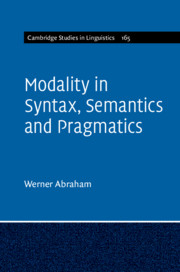Book contents
- Modality in Syntax, Semantics, and Pragmatics
- Cambridge Studies in Linguistics
- Modality in Syntax, Semantics, and Pragmatics
- Copyright page
- Dedication
- Contents
- Tables
- Preface
- Acknowledgments
- Abbreviations and Special Symbols
- Introduction
- I Modes of Modality
- 1 Pragmatics: Modality and Speaker Orientation
- 2 (Inter)Subjectification and Foreign Consciousness Alignment
- 3 Modality as Distance: From Aspect to Modality
- II Verbal Modality
- III Adverbial Modality
- IV Covert Modality
- Bibliography
- Index
2 - (Inter)Subjectification and Foreign Consciousness Alignment
from I - Modes of Modality
Published online by Cambridge University Press: 06 February 2021
- Modality in Syntax, Semantics, and Pragmatics
- Cambridge Studies in Linguistics
- Modality in Syntax, Semantics, and Pragmatics
- Copyright page
- Dedication
- Contents
- Tables
- Preface
- Acknowledgments
- Abbreviations and Special Symbols
- Introduction
- I Modes of Modality
- 1 Pragmatics: Modality and Speaker Orientation
- 2 (Inter)Subjectification and Foreign Consciousness Alignment
- 3 Modality as Distance: From Aspect to Modality
- II Verbal Modality
- III Adverbial Modality
- IV Covert Modality
- Bibliography
- Index
Summary
The ubiquitous notion of subjectivity (or subjectification) is critically scrutinized. It will be shown that a certain class of discourse particles and a solid class of modal verbs in German are specific carriers of a wide set of modalities: intransitive ones with root and epistemic modalities expressed by verbs, and transitive modalities as emanating from and the speaker to the hearer and back.
Keywords
Information
- Type
- Chapter
- Information
- Modality in Syntax, Semantics and Pragmatics , pp. 60 - 71Publisher: Cambridge University PressPrint publication year: 2020
